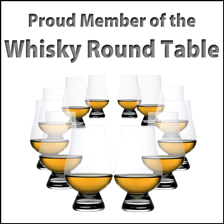 The Whisky Round Table consists of 12 noble knights who discuss all things whisky on a monthly basis. This October issue was raised by Keith of Whisky Emporium:
The Whisky Round Table consists of 12 noble knights who discuss all things whisky on a monthly basis. This October issue was raised by Keith of Whisky Emporium:
I have recently had a few discussions relating to the differences between whisky bottled today and that bottled in past years. A good example of this is the comparison between two MiltonDuffs which I recently tried. They were both OB 12y offerings, one bottled in the early 1980’s, the other in the late 1980’s and they were drastically different. In addition both are completely different to more modern Miltonduff 12y expressions. Also, compare the OB Talisker 10y of 30 years ago with the ‘same’ offering of today and I am sure you’ll find them completely different. One of my discussions on this subject led to my counterpart suggesting that any differences in taste were due to ‘bottle ageing’ and could not be explained solely by differences in distilling procedures or raw meterials being used.
So, this month’s question is as follows;
I know that officially the ageing or maturation of whisky is defined as the time spent in oak casks, but apart from that, do you believe in any form of ‘bottle ageing’ being accountable for changes in the flavour of whisky over a period of years whilst still in the bottle? (I am also talking about originally sealed and unopened bottles, as we all know that once a bottle is opened, oxidisation of the whisky can and often does occur).
Follow this link for the twelve answers to this great question.
As a reminder, the valiant knights (and links to their blogs) of this round table are:
Chris – Nonjatta
Keith – Whisky Emporium
Karen & Matt – Whisky For Everyone
Ruben – Whisky Notes
Mark – Glasgow’s Whisky (And Ale)
Neil & Joel – Caskstrength.net
Lucas & Chris – Edinburgh Whisky Blog
Jason – Guid Scotch Drink
Gal – Whisky Israel
Mike – Whisky Party
Peter – The Casks
Joshua (hey, that’s me!)– The Jewish Single Malt Whisky Society
